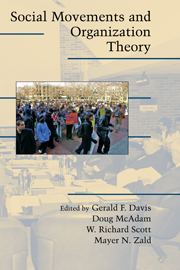Book contents
- Frontmatter
- Contents
- Contributors
- Preface
- I Creating a Common Framework
- II Political and Mobilization Context
- 3 INSTITUTIONAL VARIATION IN THE EVOLUTION OF SOCIAL MOVEMENTS: COMPETING LOGICS AND THE SPREAD OF RECYCLING ADVOCACY GROUPS
- 4 ELITE MOBILIZATIONS FOR ANTITAKEOVER LEGISLATION, 1982–1990
- 5 INSTITUTIONALIZATION AS A CONTESTED, MULTILEVEL PROCESS: THE CASE OF RATE REGULATION IN AMERICAN FIRE INSURANCE
- 6 FROM STRUGGLE TO SETTLEMENT: THE CRYSTALLIZATION OF A FIELD OF LESBIAN/GAY ORGANIZATIONS IN SAN FRANCISCO, 1969–1973
- III Social Movement Organizations: Form and Structure
- IV Movements Penetrating Organizations
- V Conclusion
- References
- Author Index
- Subject Index
3 - INSTITUTIONAL VARIATION IN THE EVOLUTION OF SOCIAL MOVEMENTS: COMPETING LOGICS AND THE SPREAD OF RECYCLING ADVOCACY GROUPS
Published online by Cambridge University Press: 05 September 2012
- Frontmatter
- Contents
- Contributors
- Preface
- I Creating a Common Framework
- II Political and Mobilization Context
- 3 INSTITUTIONAL VARIATION IN THE EVOLUTION OF SOCIAL MOVEMENTS: COMPETING LOGICS AND THE SPREAD OF RECYCLING ADVOCACY GROUPS
- 4 ELITE MOBILIZATIONS FOR ANTITAKEOVER LEGISLATION, 1982–1990
- 5 INSTITUTIONALIZATION AS A CONTESTED, MULTILEVEL PROCESS: THE CASE OF RATE REGULATION IN AMERICAN FIRE INSURANCE
- 6 FROM STRUGGLE TO SETTLEMENT: THE CRYSTALLIZATION OF A FIELD OF LESBIAN/GAY ORGANIZATIONS IN SAN FRANCISCO, 1969–1973
- III Social Movement Organizations: Form and Structure
- IV Movements Penetrating Organizations
- V Conclusion
- References
- Author Index
- Subject Index
Summary
Students of organizations and social movements recently have highlighted the potential fruitfulness of examining the ways in which ideas and research developments in the organizational theory and social movement literatures can be usefully brought together to advance knowledge (Fligstein 1996; Clemens 1997; Davis and McAdam 2000; Rao, Morrill and Zald 2000). In this chapter, I aim to push such cross-pollination further by reorienting research attention away from the study of institutionalization that has been prominent in both literatures. The institutionalization of social movements involves the transformation of contentious politics that involve tactics such as protest into more conventional forms of political action such as lobbying (Meyer and Tarrow 1998). In organization theory, institutionalization typically refers to the processes by which particular kinds of practices or forms become legitimate and diffuse throughout organizational populations (Strang and Soule 1998). Both literatures have tended to invoke an imagery of incremental change that focuses on how existing social structures maintain stability and elite positions become reproduced.
Recently, some organizational institutionalists have begun to eschew the study of institutionalization and focus more on how qualitative shifts in the core practices of organizations change in tandem with broader institutional beliefs (Scott 2001). The concept of institutional logic has been used to study such shifts and highlight the interconnections between higher order belief systems and lower level material practices and routines (e.g., Friedland 2002).
- Type
- Chapter
- Information
- Social Movements and Organization Theory , pp. 73 - 95Publisher: Cambridge University PressPrint publication year: 2005
- 39
- Cited by



